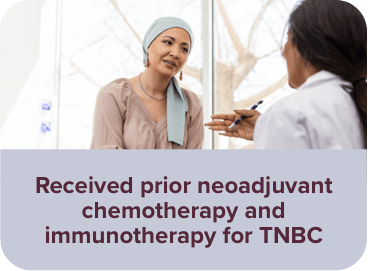The content of this website is intended for United States audiences only.
About TNBC
Breast cancer is the most common cancer in the world.1
~1 in 8 women
in the US will likely develop invasive breast cancer in their lifetime.2
About TNBC
Triple-negative breast cancer (TNBC) is a type of breast cancer where the tumor tissue tests negative for all 3 markers (estrogen, progesterone, and HER2), hence the name triple-negative breast cancer. TNBC makes up about 10% to 15% of invasive breast cancers.3
Without these markers being expressed, treatment for TNBC is more limited than other types of breast cancer and may require a different approach.3 This is why studies like ASCENT-05 are important for the TNBC community.
Always talk to your doctor before joining a clinical trial.
Why participate?
If you decide to join after qualifying, you will receive the following during the trial:


You may also be reimbursed for study-related travel costs to trial visits.
In addition, joining a clinical trial may:


Always talk to your doctor before joining a clinical trial.
Do I qualify?
You may be eligible to join if you:




Always talk to your doctor before joining a clinical trial.
Find a study site
To find a study location near you, search your zip code.
Frequently Asked Questions
About ASCENT-05
What is the time commitment?
If you agree to participate in this study, you will be asked to sign an informed consent form. Then you will enter a 4-week screening period, where the research team will see if you qualify to participate in the study. Once you qualify and enroll, there will be a treatment period with visits to evaluate your disease status. If your disease unfortunately returns, you will enter a long-term follow-up period.
What does it mean if I provide “informed consent”?
Your written informed consent is required before being enrolled in ASCENT-05. This means you have been provided all relevant information about the study design, how you will participate, your right to withdraw at any time, study alternatives, your personal data protection and the associated risks and benefits, and have had the opportunity to ask any questions and agree to participate. Informed consent is designed to protect your safety and privacy.
Where will I go to participate in ASCENT-05?
The ASCENT-05 study will be conducted at approximately 350 sites around the globe.
Can I withdraw from ASCENT-05?
Yes, participation is voluntary and you may withdraw from a clinical trial at any time.
What if I don’t qualify to participate?
If you don’t qualify due to not meeting the trial criteria, the onsite study team may make recommendations about the next steps to take.
How is my personal information protected?
As with all medical records, participant privacy and confidentiality in trials are protected by law. Once the consent form is signed, you will be given a trial code. Your trial records will not include your name or personal identity but will identify you with a trial code. This code can only be tracked back to you via a code key which is held by the responsible physician. Your name or personal identity will never be disclosed.
Who is the clinical trial sponsor?
Gilead Sciences is conducting the ASCENT-05 clinical trial. Gilead Sciences is a global biopharmaceutical company that is headquartered in Foster City, California.
Am I allowed to visit my usual healthcare provider when enrolled in ASCENT-05?
Participants are always welcome to visit their usual healthcare providers during a trial. Sometimes, it is important for healthcare providers to collaborate with the research team to ensure success.
Who is on the clinical trial team?
There are a wide variety of professionals involved with any clinical trial, all of whom are vital to ensuring safety and success. The principal investigator, or PI, leads the trial and directs the team of doctors, nurses, and other healthcare workers. The clinical trial coordinator manages day-to-day activities and is the main contact for participants. Many clinical trials also have an independent Data and Safety Monitoring Board (DSMB) who periodically reviews data to ensure participant safety, and sometimes effectiveness.
About Clinical Trials
What is a clinical trial?
Clinical trials answer questions about how well a treatment or therapy works and/or how safe it is by monitoring its effect on people (often through bloodwork and other tests, as well as checking for symptoms and side effects). The people in clinical trials are called clinical trial participants and are volunteers who may be healthy or have a specific illness or condition.
Why do we need clinical trials?
Clinical trials are used to determine the safety data and effectiveness of an experimental treatment. The treatment can be a drug, vaccine, medical device, medical procedure, and/or behavioral intervention. Before treatments can be used by the general public, they must undergo a series of clinical trials, called phases, and be approved by regulatory agencies (such as the FDA in the United States and the European Medicines Agency [EMA] in Europe).
Do participants learn the results of their clinical trial?
After your participation ends, the study may continue for months or years. Once final results from all participants are compiled and analyzed, they are often published publicly. Clinical study report (CSR) synopses and plain language summaries (PLSs) may be made available for certain studies. Check with your clinical trial site or send an email to [email protected] to learn more.



